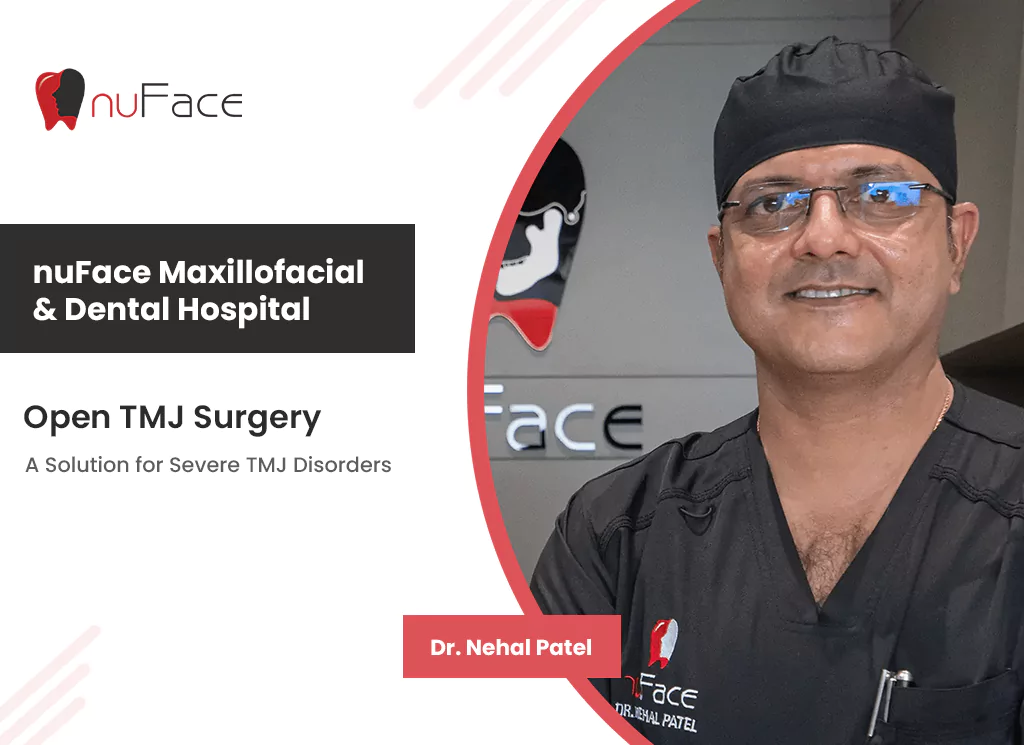A Solution for Severe TMJ Disorders
Temporomandibular Joint (TMJ) disorders affect millions worldwide, leading to chronic pain and dysfunction in the jaw joint and muscles controlling jaw movement.
While conservative treatments like medications and physical therapy may relieve symptoms, in severe cases, open TMJ surgery becomes necessary.
This blog explores when and why open TMJ surgery is needed, the procedure, recovery, and how Dr. Nehal Patel at nuFace Maxillofacial and Dental Hospital offers a cutting-edge solution for patients suffering from debilitating TMJ disorders.
What is Open TMJ Surgery?
Open TMJ surgery is a surgical procedure that directly accesses the temporomandibular joint to repair or remove damaged tissue.
This procedure is often recommended for patients whose TMJ problems do not respond to less invasive treatments like injections or arthroscopy.
Common reasons for open TMJ surgery include:
- Severe joint damage due to arthritis
- TMJ dislocation
- Joint tumors
- Degenerative joint diseases
Open surgery is typically reserved for complex cases where structural changes in the joint are necessary for long-term relief.
When is Open TMJ Surgery Required?
Most patients begin their treatment journey with non-surgical options such as splints, medications, and physical therapy.
However, certain signs indicate that surgical intervention may be needed:
Chronic pain:
Persistent pain that doesn’t improve with conservative treatments.
Restricted jaw movement:
Difficulty in opening or closing the mouth, which interferes with eating, speaking, and daily activities.
Structural joint issues:
Diagnosed through imaging (CT scans or MRIs), which reveal severe joint damage, such as disc displacement or bone deterioration.
Locking jaw:
In severe TMJ cases, the joint may lock, making it difficult to open the mouth.
Dr. Nehal Patel specializes in diagnosing and treating complex TMJ disorders with precision and care at nuFace Maxillofacial and Dental Hospital, using the latest technologies and techniques to ensure the best outcomes.
Open TMJ Surgery: Procedure and Techniques
Open TMJ surgery typically involves an incision in front of the ear to access the joint.
The surgeon will then remove or repair damaged tissue, replace or reposition the joint disc, or in extreme cases, replace the joint with an artificial implant.
Joint Replacement Surgery:
For patients with significant bone and cartilage deterioration, total joint replacement may be necessary.
This involves the placement of a custom-made artificial joint that restores jaw functionality and reduces pain.
Disc Removal or Repair:
Some TMJ disorders are caused by the displacement or damage of the joint disc.
In this case, surgeons can repair the disc or remove it entirely to improve joint function.
Bone Reshaping (Osteotomy):
This technique involves reshaping the joint’s bones to improve alignment and function.
This may be necessary for patients with abnormal jaw growth or development that contributes to TMJ pain.
Recovery and Post-Operative Care
Post-surgery recovery for open TMJ procedures varies depending on the complexity of the surgery.
Patients typically experience swelling, discomfort, and limited jaw movement in the initial weeks.
Dr. Nehal Patel provides a detailed recovery plan, which includes:
- Medication for pain management
- Physical therapy to restore jaw mobility
- Dietary changes: Soft food diet for the first few weeks to avoid stress on the joint
- Follow-up appointments for monitoring healing and progress
Most patients can resume normal activities within 4-6 weeks, but full recovery may take several months.
Trends in TMJ Surgery and Pain Management
In recent years, there has been an increased emphasis on personalized TMJ surgery, with a focus on minimizing invasiveness and improving recovery times.
Patients are more aware of the long-term consequences of untreated TMJ disorders, driving demand for innovative surgical solutions.
Additionally, new materials for joint replacements and advanced imaging technologies make procedures more effective and tailored to individual patient needs.
Trust in Surgical Care
For a successful outcome in open TMJ surgeries, expertise and trust in the medical professional are crucial.
At nuFace Maxillofacial and Dental Hospital, Dr. Nehal Patel brings years of experience in oral and maxillofacial surgery, ensuring patients receive high-quality care.
His strong online presence, including positive Google Reviews, Facebook, and Instagram pages, offers potential patients confidence in his skills and the hospital’s advanced treatment methods.
Open TMJ surgery is a critical option for patients suffering from severe TMJ disorders when conservative treatments fail.
With advancements in surgical techniques, patients can experience improved functionality and pain relief, restoring their quality of life.
Dr. Nehal Patel’s expertise in open TMJ surgery at nuFace Maxillofacial and Dental Hospital makes it a premier destination for both Indian and international patients seeking comprehensive treatment.
For more information or to schedule a consultation, visit our Services Page.






